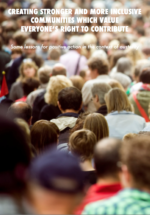Creating Stronger and More Inclusive Communities
Some lessons for positive action in the context of austerity
12 September 2011
Notwithstanding the rhetoric of ‘Big Society’, both local leaders and national policy makers face major challenges in enabling communities to identify and build upon their strengths.
This is essential so that people at risk of marginalisation can contribute to their local communities as well as receiving their communities’ support.
The authors of this pamphlet reflect on the extensive experience of five agencies which have been, in different ways, at the forefront of promoting innovations which unlock communities’ strengths and recognising that people with support needs can also be assets to their communities. We see a real danger that, in a prolonged period of austerity, the rhetoric of empowerment and inclusion will remain just that.
In this paper, addressed to all those who share our commitment to advancing equal citizenship, we draw out succinct lessons for inclusive community-building.
In particular we make a case for well thought-through investments in some emerging areas of community development, especially in those services and initiatives which neither patronise nor abandon people and communities, but which instead work alongside them in the design and delivery of solutions to what they define as their challenges.
Our seven principles for empowerment and inclusion in an age of austerity are:
- Community development needs to start from how people themselves define their situation, the challenges they face and their aspirations and assets.
- Communities are stronger where people who use services are helped to find good ways of making a valued local contribution, not just seen as in need of care.
- Most support is delivered by families and social networks: it is critical that services support and work in partnership with people who make unpaid contributions.
- The personalisation of public services marks a genuine change when it represents a change in culture, aspirations and the availability of a wider choice of support providers, not just a change in funding mechanisms.
- To live fully, we all need to be able to make informed choices, to take risks and to experience the consequences of our choices.
- Public sector contributions are more cost-effective when they look across the pattern of local assets and needs, not just at those assessed as ‘most needy’.
- Micro-scale enterprises and interventions can be a powerful vehicle for mobilising new contributions and enabling people to co-design and share ownership in services which are personalised to their needs.
Topics Macroeconomics Public services







